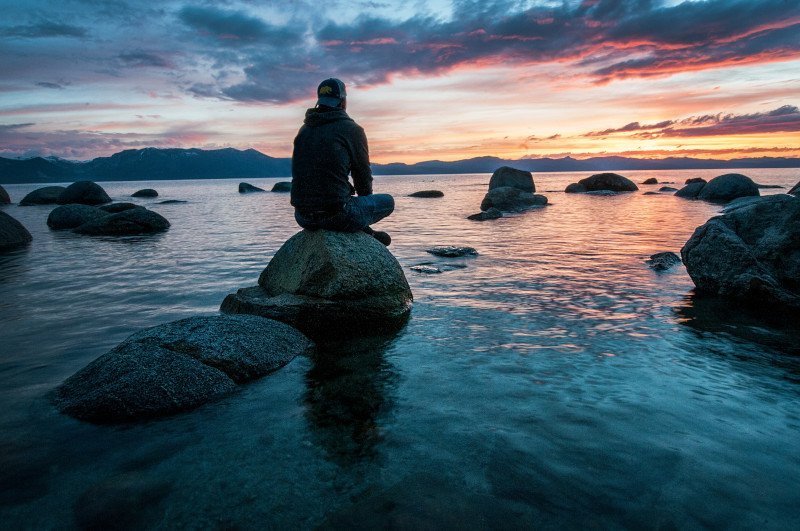How to be alone – Finding Strength and not Despair in Solitude

Thinking about how to be alone implies that it is not easy. Or not even natural.
While being in solitude may not always be easy, it is certainly a natural part of life. And let’s raise the stakes on that statement: Mastering how to be alone is a skill you want to hone as it gives you an edge in life. Some may even call it a superpower.
Here is how to be alone, along with some considerations about solitude as food for thought. The goal is to make this often overlooked vital quality work for us.
Contemplating Solitude Has Various Reasons
Any reason to contemplate solitude is valid. Franky did it his way, and we are going to do it our way.
However, there is a good chance that we only think about how to be alone once we find ourselves in a situation that forces us to spend time by ourselves. When our romantic relationship has ended, we feel the painful burden of loneliness. Or when we haven’t made social connections yet in a new environment. We feel the pinch of social isolation. We all do, at varying degrees.
Extroverts tend to feel the pain of loneliness more easily than introverts. So, finding oneself in solitude is for extroverts the opportunity to look beyond the pain and find value in being alone.
In turn, for introverts, spending time alone is a natural disposition. Often, introverts have to make peace with their inclination towards peace and quiet. Because current mainstream society favors groups and extroversion, they have to first accept their introversion as a perfectly healthy and indeed beneficial disposition.
What is true for all of us is that we are social animals and that prolonged periods of isolation are harmful to our human nature. Prisoners in solitary detention and explorers trapped in secluded territories have reported feelings of being disconnected from reality and disintegration of their personalities. For a vivid illustration, read Richard E. Byrd’s book ‘Alone,’ a retelling of his five distressing months in isolation in Antarctica.

Loners are Among Us, and They Have Made Important Contributions
The preeminent biologist E. O. Wilson confirms that we are social animals. We have ‘the overpowering instinctual urge to belong to groups in the first place, shared with most kinds of social animals…A person’s membership in his group – his tribe – is a large part of his identity. It also confers upon him to some degree or other a sense of superiority.’
Hence, it is of little wonder that so many introverts feel the need to come to terms with their antisocial tendencies. And that mainstream society frowns upon loners.
Yet, loners are among us. As societies become more globalized and complex, chances increase that people find themselves at the intersection between various groups or entirely outside of them.
But loners have always been part of the human family. In the early hunter-gatherer days living outside the tribe was prohibitively dangerous. Later, as groups and societies became more varied, loners were the mystics, wizards and witches, prophets, and jesters. Or they were the lunatics if due to social marginalization and ostracization, they did not manage to hang on to their wits.
What all these men and women had in common was an outside view of society. And an outside perspective can be a boon to uncover novel insights.
In ‘Party of One – The Loner’s Manifesto,’ Anneli Rufus claims that as much as 25 percent of the world’s population are loners. And they are loners by choice, not out of necessity. They are men and women like the Buddha, Rene Descartes, Isaac Newton, Emily Dickinson, Greta Garbo, Bobby Fischer, J. D. Salinger. By drawing from countless cultural tellings, Rufus’ book makes a strong case to view loners not as abnormal individuals, but as the creative contributors to humanity they so often are.
Susan Cain’s 2012 bestseller ‘Quiet – The Power of Introverts in a World That Can’t Stop Talking’ is a cornerstone publication of what some observers have called the introvert revolution.
Cain’s central premises are the fundamental differences between extroverts and introverts and that introverts require special care to flourish in an extrovert world.
While extroverts tend to like noise and need external stimuli, introverts usually prefer to spend time alone and contemplate. Research has shown that preference for extroversion or introversion comes down to a cerebral difference in responsiveness to external stimuli.
As a result, in a dominantly extrovert world, introverts are like orchids that need a suitable environment to thrive. As such, succeeding as an introvert starts with realizing one’s nature and then carving out that niche in a noisy world.
From my own experience, I can say that appreciating introversion as my standard and resisting the social ostracization, opened a profound channel of contentment in my life.
And for extroverts, recognizing an introvert disposition lends itself to seeing silence as the power source for creativity it can be. And why not spend time alone as an extrovert?
Aloneness is not Loneliness
Loneliness is aloneness tainted with the feeling of lack. Feeling deficient of social connection and having somebody around to listen to our verbiage. Or share our aversions and fears.
So what to do when we find ourselves feeling lonely? Take a deep breath in and feel yourself relax as you exhale. And check in with yourself. Being alone at this moment is an opportunity to look inside. Why do we feel lonely? What is lacking?
And then realize, aloneness is our very nature, just we may not be aware of it. We came alone into this life, and we will depart alone. If we feel lonely, perhaps it is because we have remained strangers with ourselves.
Thus, being alone is the chance to familiarize ourselves with our natural aloneness. Feel the beauty and bliss not having to respond to anyone, just breath and look around how things are this moment. Then the poor, negative, and gloomy framing of being alone can change. But the realization of the beauty of aloneness requires mental strength to look beyond the immediate feeling of scarcity. And to stay with the internal noise that distracts us from looking inside.
The philosopher Arthur Schopenhauer said, ‘I have long held the opinion that the amount of noise that anyone can bear undisturbed stands in inverse proportion to his mental capacity and therefore be regarded as a pretty fair measure of it.’
Can you bear the inner noise when being alone? If it is hard, start in small intervals and gradually increase the time you spend by yourself. This way, you can learn how to be alone by cautiously familiarizing your mind with the beauty of being alone. Whatever works is the right way.
And there is a precious price at the end of the tunnel, which puts loneliness into a whole different light.
After being in tune with your aloneness, we can much better relate to others. Now relationships will bring great joy because we do not partake in them out of fear or assumed necessity.
When you now meet with people, it is to share, learn, and enrich. And not to cover up loneliness. In the case of a romantic relationship, the encounter is now between two personalities rather than two people seeking companionship as not to be alone. Case in point, if a lover tells you she is with you because of loneliness, kindly take leave.

Knowing How to be Alone Gives You Resourcefulness in Life
Once you have found comfort in aloneness, you gain tremendous freedom. Foremost is the freedom to express. Feeling comfortable alone with oneself implies being able to withstand the urge of the group and listen to oneself. Not only to listen to oneself but to step up one level of consciousness to assume the position of observer of our environment and ourselves.
As a result, our projects and endeavors undergo a shift in dynamics from complying with the demands of the group towards an expression of our inner potential. Such kinds of manifestation are the resourcefulness of a creator realizing her hidden potential.
English psychiatrist, psychoanalyst, and author Anthony Storr masterfully develops the case for individual creativity in his 1988 classic ‘Solitude A Return to the Self.’ We don’t only thrive on relationships as social animals, but also the withdrawal from other people. And it is in retreat, according to Storr, that we get in touch with our inner creativity and thus can make an essential contribution to societal progress and health. This book is a great reminder and eye-opening journey for people stressed by the daily grind and looking to connect to their inner selves in solitude.
Schopenhauer was a champion and advocate of solitude and even maintained that ‘a man can be himself only so long as he is alone; and if he does not love solitude, he will not love freedom; for it is only when he is alone that he is really free.’
Storr must have been delighted and mentioned Schopenhauer as one of the world’s many greatest thinkers who have not reared families or formed close personal ties. Others include Descartes, Newton, Locke, Pascal, Spinoza, Kant, Leibniz, Nietzsche, Kierkegaard, and Wittgenstein.
And social research shows that more people are choosing aloneness in today’s world.
An Increasing Amount of People Choose Living Alone
Eric Klinenberg’s 2012 sociological examination ‘Going Solo’ sheds light on the remarkable demographic shift towards people being alone. What Klinenberg calls ‘the Extraordinary Rise and Surprising Appeal of Living Alone’ describes the sharp increase in the number of people taking on life by themselves.
In 1950, a mere 22 percent of U.S. American adults were single. Sixty years later, that number had risen to more than 50 percent. About 28 percent of all U.S. Households are singles, which makes them the most common domestic unit. Figures in other Western countries show comparable trends.
The two main enablers for this dramatic change are women and technology.
Between 1950 and 2000, the number of working women in the U.S. jumped from 18 million to 66 million. This increase in the female workforce made women financially independent from their traditional role of supporting mother at home. As a result, many chose to live alone.
Second, the proliferation of communication technologies made staying in touch much easier. Thus, living alone hasn’t had the same feeling of loneliness ever since.

Living Alone Comes with Advantages at Any Stage of Life
When we are young, making a living alone naturally can help raise confidence and create a sense of autonomy. But this is also true later in life for divorcees. Especially when being in a relationship lacked the feeling of warmth and companionship one would desire when making the compromise to live with another person.
Also, living alone comes with a much higher degree of control over our lives. When partners do not share a lot of the same interests, it can become tedious always to compromise. Thus, going it, solo can enable both to pursue the things they desire freely.
And in old age, staying alone may help keep a sense of dignity and freedom. Many older women, in particular, prefer to go solo in the concluding stage of their lives over marrying again or staying with their siblings. This independence can give the elderly a renewed sense of purpose, which in turn is a boon for their health.
So, according to Klinenberg, more and more people are getting good at being alone and are enjoying it. They are enjoying going solo by naturally focusing on the advantages of their life choice.

Master How to Be Alone by Focusing on the Benefits
Foremost, mastering being alone is not about dealing with the sad state of lacking human connection. Instead, it is about moving into silence to uncover the deeper layers of our selves. It is here that we gain a different perspective. Because when being alone, we are automatically resisting any potential downward pull of the group and can listen more efficiently to our inner voice.
As in so many areas of life, the trick is to focus on what you want, not on what you are trying to avoid.
When you are alone, you have to own all your decisions alone. This freedom comes with responsibility, the responsibility to take charge of your life. At this point, we also realize that being alone is a better state than being with people who are not aligned with what we are looking for in life.
For this reason, involving Schopenhauer one more time, ‘great men (and women!) are like eagles, and build their nest on some lofty solitude.’







